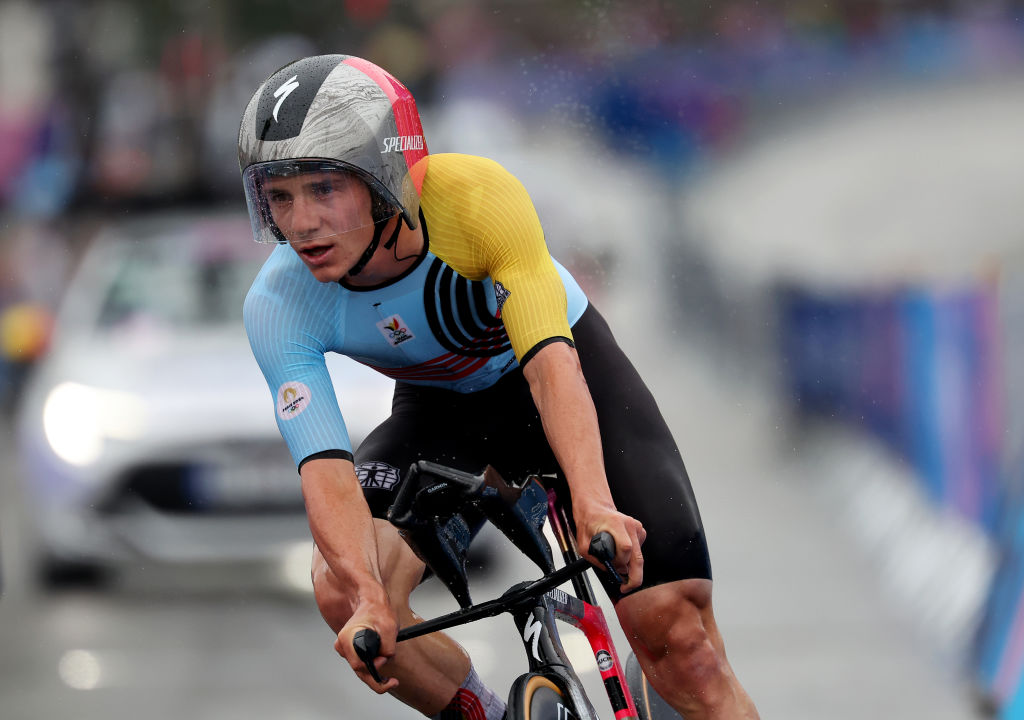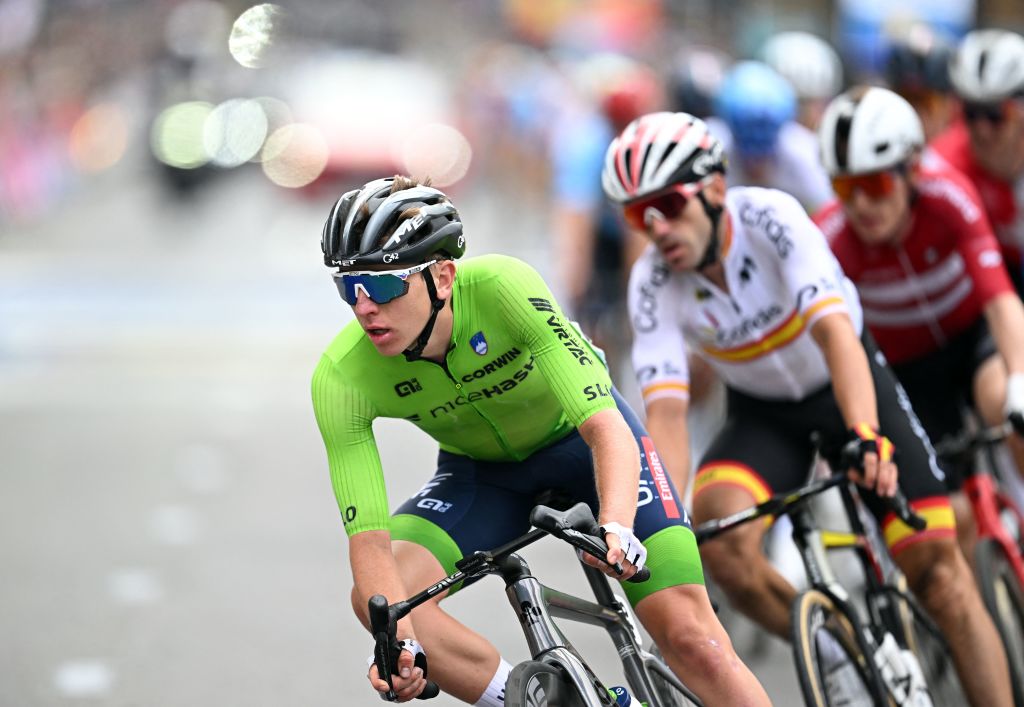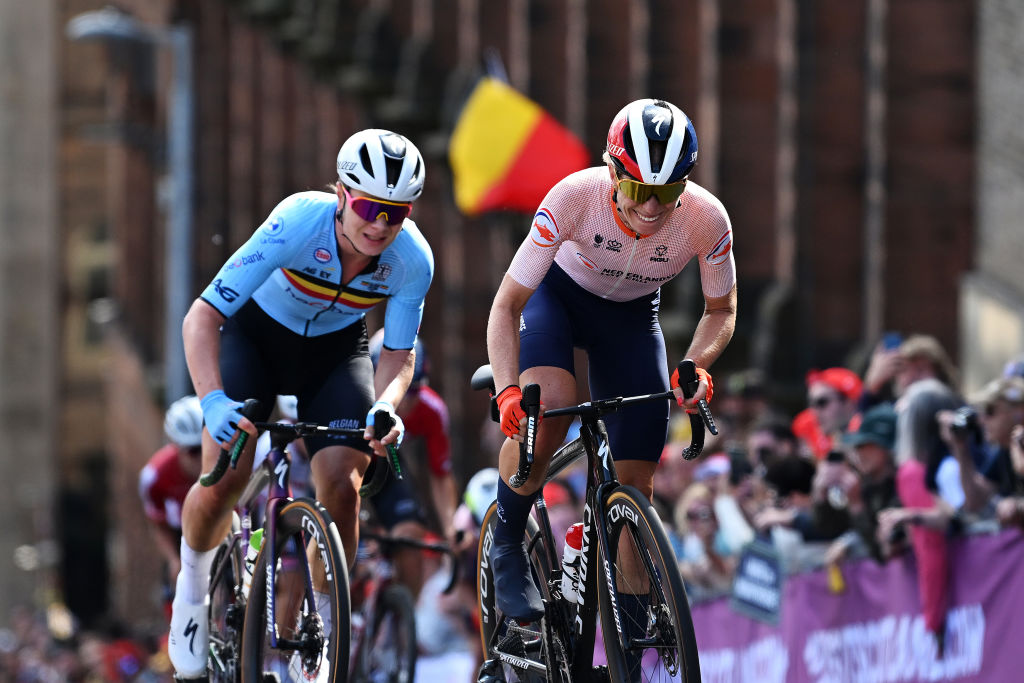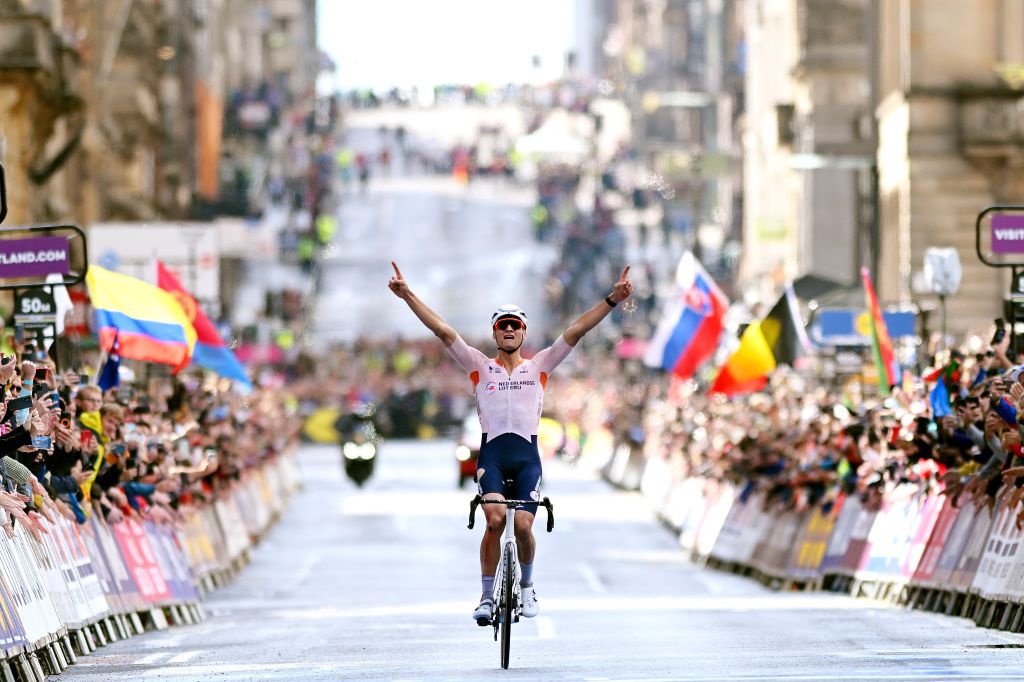On the eve of the 2024 UCI Road World Championships, Zürich’s newspaper of record, the Neue Zürcher Zeitung, detected a certain ambivalence among inhabitants towards the event after a summer when the city had already ground to a halt for a series of concerts and festivals.
“Street Parade, Taylor Swift, Cycling World Championships – is there too much spectacle in Zürich?” read the headline. Green party councillor Urs Riklin didn’t entirely disagree. “If necessary, I’m happy to put the brakes on the fun,” he said, the kind of line that surely only a politician from the sober city of high finance would ever dare to put on the record.
The only certainty for now is that the Zürich Worlds will put the brakes on the city’s notorious traffic for much of the week. The Tour de Suisse has generally avoided the city by the lake in recent years for that specific reason, but the canton of Zürich shelled out for the Weltmeisterschaften expressly to showcase the city centre and its lakefront to the world.
“During the application phase, it was clear early on that we wanted to go downtown, it was a central element of the application, it gives the event a completely different global impact,” said Olivier Senn, director of the Tour de Suisse and head of the local organising committee in Zurich.
“But of course, the decision has consequences, especially since Zurich has its own peculiarities, with tram lines on many streets.”
Some 40 traffic islands have been dismantled or altered expressly for these Worlds, with the roadworks contributing heavily to local complaints. So, too, has the estimated budget of 22 million CHF, two-thirds of which has come from the federal and local governments.
“I have my doubts as to whether the expenditure that the public sector has to make really flows back in the form of tax revenue,” Riklin said. “That doesn’t mean that it shouldn’t be done, but we should be honest.”
The latest race content, interviews, features, reviews and expert buying guides, direct to your inbox!
Such discussions, of course, are a familiar part of the preamble to just about every major sporting event in the 21st century. For better or for ill, local disquiet tends to become more muted once the spectacle gets underway, while the UCI’s circus will have packed up and left town long before the event’s legacy and financial claims can be properly scrutinised.
“At the moment, there’s also critical talks about it, as there always is nowadays with big events,” home favourite Stefan Küng told Cyclingnews. “But I’m pretty confident it’s going to be a week of good sport and good ambience, and I hope it’s also going to give another boost to cycling in Switzerland.”
Time trials open the action
For only the second time, the Para-Cycling World Championships are combined with the Cycling World Championships, meaning that there are some 53 races on the schedule across nine days. The action in Zürich started on Saturday afternoon with the mixed handbike team relay, while the opening weekend of the Worlds also features two of the week’s marquee events, the elite women’s and men’s individual time trials.
The courses were closed for the official recon on Saturday afternoon, but many of the elite contenders had already been out to sample the terrain on Thursday and Friday, traffic be damned.
Remco Evenepoel, inevitably, drew notice on Strava with his time up the main climbs, while his compatriot Lotte Kopecky noted the pitfalls when dropping over the other side. “There are fast descents that you have to ride carefully but at high speed, even on some blind spots,” she said.
The thought was echoed by compatriot Victor Campenaerts. “It’s not easy,” he said. “Every corner is dangerous if you don’t use the brakes. It’s about finding the limit without taking too many risks.”
The women’s time trial is 29.9km in length, setting off from Gossau, with the first checkpoint coming atop the steady climb from Oetwil am See after 12km or so. A rolling section follows until the race hits the shore of Lake Zürich with 12km remaining for the flat and fast run-in to the finish on Sechseläutenplatz.
Defending champion Chloe Dygert (USA) is the obvious favourite, though she will have to reckon with Olympic champion Grace Brown (Australia), riding in the final World Championships of her career. Kopecky, meanwhile, arrives at the Worlds fresh from a crushing victory over Ellen van Dijk (Netherlands) at the European Championships last week.
Olympic silver medallist Anna Henderson missed the European Championships due to Great Britain’s decision not to send a team for the third time in four years, but she will be a contender in Zürich. Demi Vollering (Netherlands), meanwhile, might find the rugged terrain early in Sunday’s time trial to her liking.

The elite men’s time trial follows later on Sunday afternoon, taking place on a 46km course that sets out from one of the holy places of Swiss cycling, the Oerlikon Velodrome. The uncovered track hosted the Worlds on seven occasions, while it was also the site of some gripping finales to the Züri-Metzgete, a race that was sadly discontinued not long after the old World Cup made way for the WorldTour.
After a relatively flat opening section, the men’s route links up with the women’s course just beyond Gossau, tackling the same climb from Oetwil am See shortly after the midpoint before the rapid finale along the lakeshore.
“You can divide the route into three parts: flat at the beginning, then quite hilly and finally flat again along the lake,” said Küng. “Pacing will play an important role.”
Campenaerts is adamant that his compatriot Evenepoel is the man to beat, while he was less convinced by the prospects of the Ineos duo of Josh Tarling (Great Britain) and Filippo Ganna (Italy).
“I’m not sure, because their most recent results don’t say a lot,” Campenaerts said. “I think Primož Roglič and Stefan Küng will finish on the podium with Remco – but Remco is the big favourite.”
Few would disagree with that part of his assessment. Evenepoel, the reigning world and Olympic champion is widely expected to add another line to his palmarès here, though Soudal-QuickStep manager Patrick Lefevere pointed out it wasn’t a case of simply turning up in Zürich to collect another rainbow jersey.
“Remco would like to keep his jersey for another year,” Lefevere wrote in Het Nieuwsblad on Saturday morning. “But I wonder: can you peak three times in one year?”
Enter Pogačar

That, of course, is a question that will dominate all others in the build-up to the elite road races next weekend. In men’s cycling, Tadej Pogačar‘s dominance has been the story of the season, and the Slovenian is chasing his latest chunk of history in Switzerland.
After winning the Giro d’Italia and Tour de France, Pogačar is now seeking to emulate Eddy Merckx and Stephen Roche to become only the third man to complete the Triple Crown of Giro, Tour and Worlds in the same season.
The blinding wattage of Pogačar’s sheer star power helps to offset the regrettable absence of grandees like the injured Wout van Aert and home favourite Marlen Reusser. Even in a road race that features Evenepoel and defending champion Mathieu van der Poel, Pogačar’s is the narrative that eclipses all others. His status as favourite for the road race title was only underscored by his remorseless solo victory at the Grand Prix Cycliste de Montréal last Sunday.
The multitudes who will line the 27km finishing circuit next Sunday will expect to witness a coronation as much as a bike race, a moment to resonate in World Championships history like Fausto Coppi’s immortal solo victory in Lugano in 1953.
But the beauty of a Worlds road race is that it is only occasionally as straightforward as all that. The most recent Swiss Worlds demonstrated as much. Fabian Cancellara was the favourite in Mendrisio in 2009, but the title fell to Cadel Evans, who wasn’t even Australia’s outright leader.
Back in 1996, meanwhile, Johan Museeuw was a most surprising winner in Lugano on a course most had expected to be far too demanding for a rider of his attributes.
In any case, before Pogačar enters the fray next Sunday, there will be multiple other strands to follow in Zurich. In the junior men’s road race, Paul Seixas (France) will be the man to watch ahead of his move to the WorldTour with Decathlon-AG2R next season, while Isaac del Toro (Mexico), Alec Segaert (Belgium) and Giulio Pellizzari (Italy) are among the pro riders who have opted to line out at under-23 level here.

In the elite women’s race, Vollering will seek a rainbow jersey to offset the disappointment of her near miss at the Tour de France Femmes, though Kopecky’s form at the recent Tour de Romandie suggests she will put up a resolute defence of her crown even on a course as demanding as this.
Such conjecture is all part of the intrigue in World Championships week. The junior and under-23 races will be parsed for pointers for the elite riders at the weekend, while the form lines of the contenders will be analysed and debated on a loop from here until then.
Behind closed doors, meanwhile, team coaches will set about the delicate task of persuading trade team rivals to find common cause in the national jersey. Off the bike, David Lappartient’s bid for the IOC presidency – and what that means for his UCI mandate – will come under considerable focus.
The local organising committee, meanwhile, will hope that the criticism of the UCI jamboree will dampen once the rainbow jerseys start being distributed. Senn told NZZ that the Worlds would be deemed a success if the races passed off safely and “if the event was somewhat bearable for the affected residents and businesses thanks to our measures.”
A spate of Swiss success, one imagines, would be the most effective sweetener of all. Küng will carry home hopes this Sunday, while the on-form Marc Hirschi will lead the line in the elite men’s road race next weekend. “It will be the most important race of my career,” the Bern native said.
As if proof were needed, the image repeatedly used to promote the event in the Swiss media has been that of Cancellara celebrating his victory in the time trial in Mendrisio fifteen years ago.
Some residents of Zürich will inevitably groan that these World Championships feel like they’re lasting a lifetime. In one way at least, they’re not entirely wrong.
